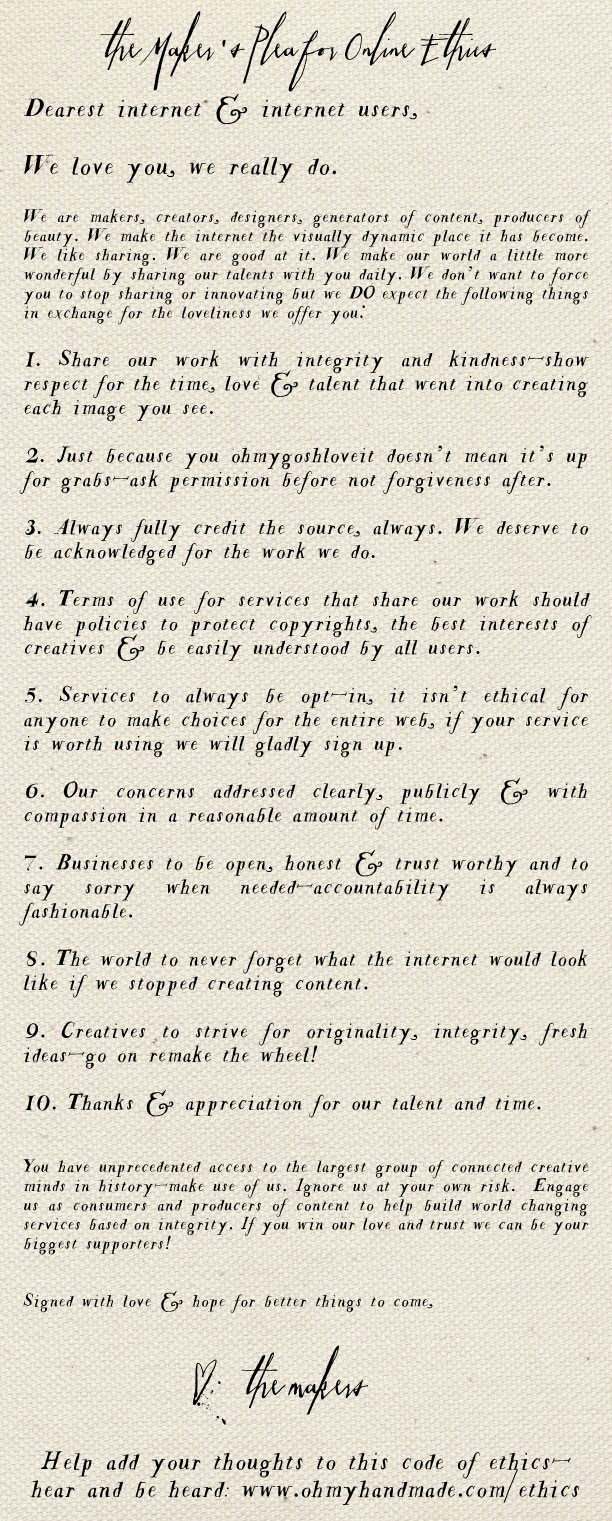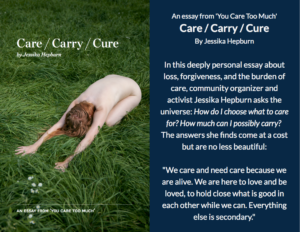With the rapidly spreading concerns about Pinterest (and by association visual sites like Tumblr, weheartit, etc…) revisiting our ethics theme couldn’t be more timely. There is a global push towards expecting ethical behaviour from the businesses we support and wanting to build our own with integrity. Makers are deciding to be educated, read fine print, and expect rapid real-time engagement on concerns or questions. When questions are not responded to, negative press spreads like wildfire. Silence has become brand suicide.
We’ll be diving into specific issues with Pinterest this month and why some of us, myself and contributor Isa of Noisette Marketing included, have deleted our boards after considering the terms of service + impact of Pinterest and realizing we couldn’t in good conscience agree. Download some of my resource list of links right here if you want to follow my sleuthing. But before we get into any of that I want to start at the heart of the problem and propose a solution inspired by the LINKwithlove Pinterest Project. I think the issues with Pinterest are part of a larger ethical question: how we the makers of content want our images used online and how we wish to be treated by users of our content.
All we’re asking, is for a little respect (just a little bit)
It is not selfish or arrogant to ask for our work to be shared responsibly or to want people to ask permission before sharing an image unless we have made our own terms for sharing clear already. We work hard to create original content and many of us feed families, pay mortgages, health insurance, and utilities with our earnings. We love making the internet beautiful and our work shared but we want respect and credit in exchange. This is fair and reasonable.
I feel internet users are divided into two groups: makers of content and consumers of content.
As makers of content it is our job to set limits and boundaries for how our work is used. I think we need to stop reacting to new services like Pinterest, Heartsy, Tumblr and so on and have a plan of action or at least guidelines for what we do/do not want before everything goes squirrelly. We might not agree on every point, that is where discussion comes in, but we can lay out some basic principles. We can hold each new business up to that code to see if it is true to those values. We could work together to encourage existing businesses or start ups to consider our wishes before they develop their service. Saving everyone a lot of heartbreak, or at least that is the hope. The 5 core ethics for OMHG are openness, compassion, community, respect and responsibility, these are the principles that have always led everything we do but I finally published them right here. This new ethics page will eventually be a home for an ongoing library of resources for makers on ethics (anyone want to volunteer for that?).
While it would be nice if content consumers educated themselves about how we want images used and stood up for our rights, it really is up to us as the creators and the ones who care deeply. It just isn’t realistic to expect pinners to thoroughly read terms of use, or tumblrs to care about asking permission, if you read the comments on almost all of these posts there are always people who don’t or won’t. What I suggest we do is co-operate to make sure services and sites that profit from our content have built in protection and policies for sharing of our work.
Make crediting a built in rather then relying on users, make services opt-in always, have companies engage makers from the beginning. We need to expect accountability from the companies who create these services from the ground up. If Pinterest had reached out to a core group of influential content producers to brainstorm and develop a policy for best practices and then crafted their terms of use to be in the best interest of makers (not just protecting themselves from liability) we would still be talking about their innovation not how intensely disappointed we are. Entrepreneurs take note!
Maybe this current wave of questioning about the ethics of Pinterest can be a lesson to us all in the power of acting with intention vs. reacting to a crisis. I have started us off by writing up my own plea to the internet for what I think makers can reasonably expect from users of their content.
Now it is our turn…
It is up to us to work together-share this, pin it, tumble it, tweet it, add your voice to the comments, write or design your own. Imagine the internet a more compassionate place, what does that look like to you? What do you think needs to be in our code of ethics as makers and producers of content? What is your own code of ethics? The more we talk and consider the closer we get to building a better online community. Encourage makers worldwide weigh in to share their concerns and ideas for a collective makers code of ethics, our vision for an internet that respects those who work so hard to make it wonderful.
At the end of March I will put our main recommendations into something we can hopefully sign in large numbers and present to Pinterest, Tumblr, weheartit, and the next new big internet thing. Why wait for someone else to fix things? Lets take it into our own hands and make it clear we are unified, supportive of each other, and willing to take positive action to protect our community. If we can stand up to support a free internet we can come together as creatives to decide what is most important to us. There are some sites that are already working towards this like LINKwithLove who do a great job encouraging users and bloggers to share intellectual property with respect. I hope we can build on that to make a clear guideline that large numbers of us can adopt and spread.
We want sites like Pinterest, we just don’t want them at the expense of ethics and rights as makers. Maybe if we make this clear enough we can encourage the next new thing (or Pinterest itself, how lovely that would be) to think first and plan ahead to create a code of ethics instead of asking forgiveness after. As creatives we have more power then ever before.
Be heard and craft a code of ethics so we can go back to happily making (and ethically sharing) all the pretty things we love.
Leave your comments and ideas below-I can’t wait to see your thoughts on a makers code of ethics.
Calling all makers! Hear & be heard-work together to craft a code of ethics for sharing our content online @ohmyhandmade <tweet it!
PS. Ben & the Pinterest team + anyone wanting to talk this out, we meet every week on Twitter at our #omhg chats-want to plan a real time chat? We’ll bring a willingness to listen and share + cake (no we won’t throw it at you).


